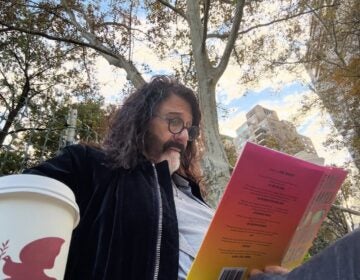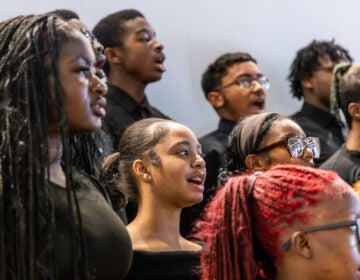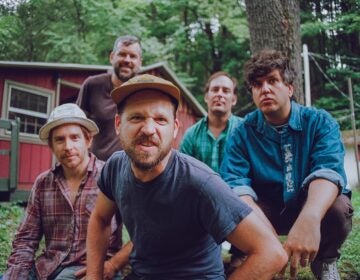Penn honors celebrated avant-garde composer George Crumb with concert series
The celebrated avant-garde composer George Crumb is being honored this week with a concert series at Penn for his 90th birthday.
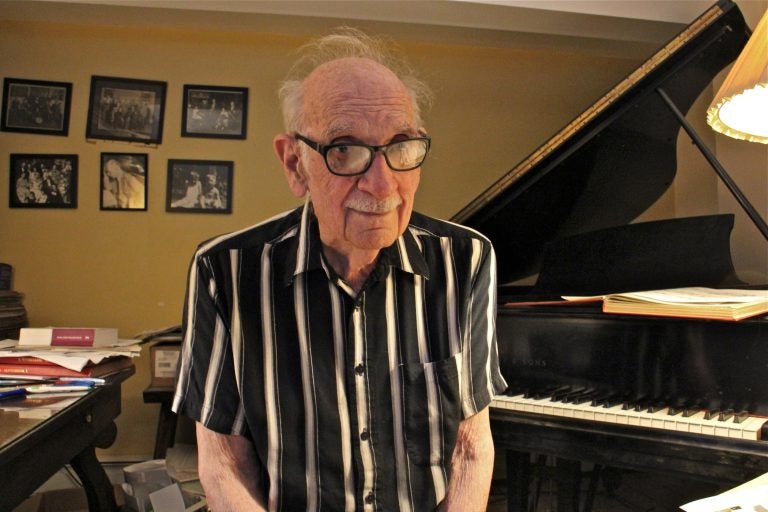
Composer George Crumb is pictured in his studio, in a converted garage at his home in Media, Pa. (Emma Lee/WHYY)
Pull into the driveway of George Crumb’s home in Media, and there’s a dirty, older-model Toyota Camry in the driveway. A leaf rake is left on the lawn. Two pit bulls, Zeus and Benji (short for Benjamin Franklin), are at the door.
The Crumbs warmly greet guests inside the door as though it were Thanksgiving. We step down into a faux-wood paneled room with a sunken floor and a stone fireplace. The worn, faux leather easy chair in front of the TV is patched with tape. Stuffed dog beds are in the corners. The room is literally a den: it has the earthy odor of animals.
Crumb leads us to what used to be the garage, a tiny room crammed with piles of sheet music, a writing desk, a folding card table, three mismatched chairs, and a piano. To get from one side of the room to another requires shifting furniture.
George Crumb — one of America’s premiere avant-garde composers, whose 70 years’ worth of work has been described as “some of the most poetic and atmospheric music written in this century,” earning him Grammys and the Pulitzer Prize — is a modest guy.
He once built a large studio on the side of the house where he could compose in more comfort. But it wasn’t comfortable.
“It was too big,” he said. “There were big windows that looked out on the backyard. There were always squirrels and birds doing their tricks out there. I couldn’t concentrate.”
Crumb prefers to work in a tight space with a low ceiling and no windows. What he hears inside his head when he’s working in West Virginia.
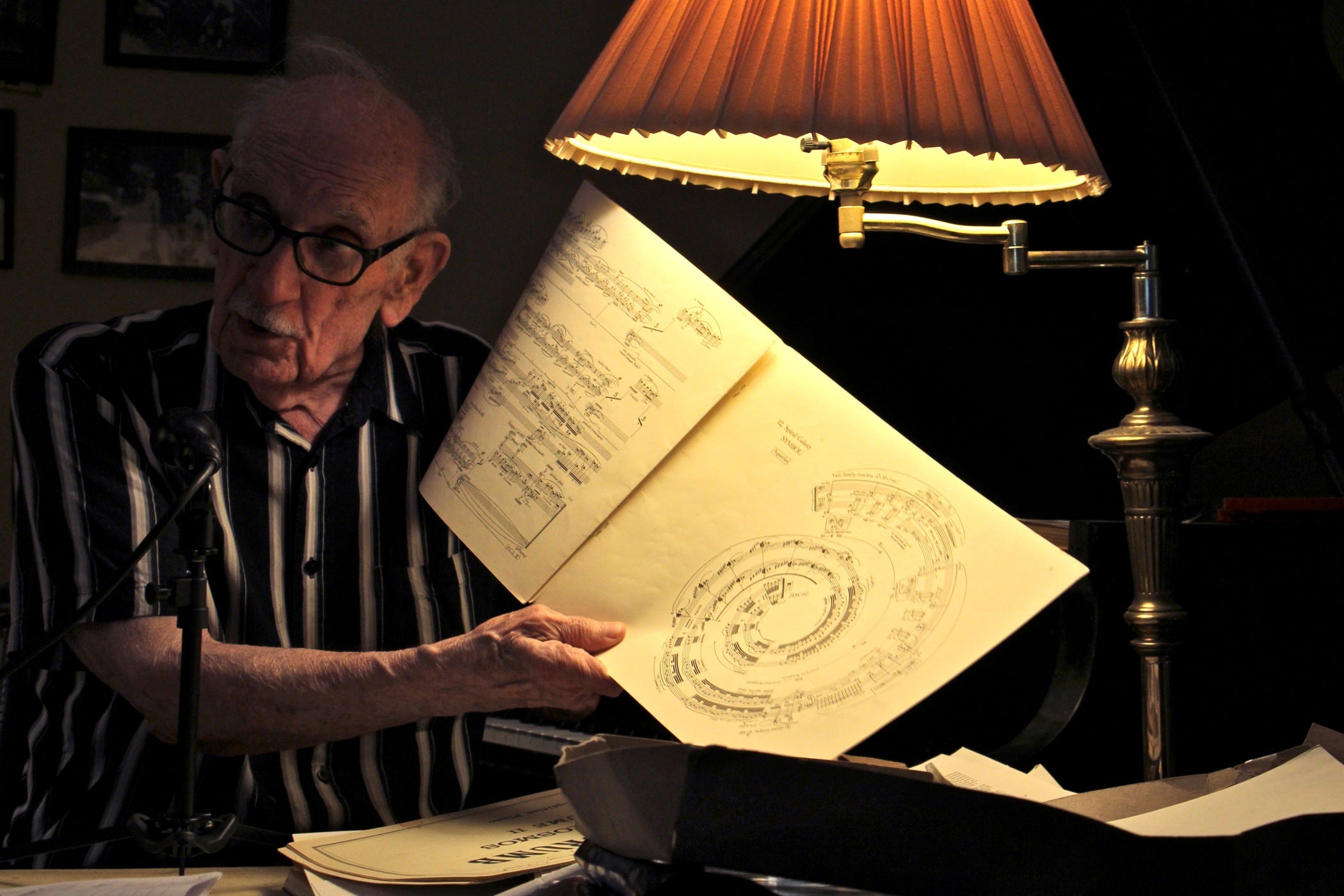
“Composers, where they grew up is built into their music,” said Crumb, born in Charleston. “If you grew up on the seashore that’s one acoustic. The mountains are another acoustic. The desert is another. If you grew up in New York City, you’re going to write like George Gershwin.
“West Virginia for me was the echo. Across the river, the sound of kids playing or dogs barking coming across and echoing off the hills,” he added. “The hills exaggerate the effect. It was a river valley.
“My music is loaded with echoes of all kinds.”
Crumb is being honored this week at the University of Pennsylvania, where he taught composition for decades, on the event of his 90th birthday.
“Zeitgeist: George Crumb at 90” will feature 12 of his works performed over three concerts, Thursday through Saturday at the Annenberg Center.
The selected works range from new ones like “Metamorphosis Book I” (he just finished Book II, but not in time for this performance) to songs he wrote as a teenager in the 1940s.
“My wife sung on those. That was 70 years ago. We were in the same high school class,” Crumb said. “I think it was about the same time we got married.”
“We’ve been married forever,” his wife, Elizabeth, calls out from the other room. (They were married in 1949.)
Some of the works being performed at the festival are well known, like “Black Angels,” a shrieking piece for electric string quartet written in response to the Vietnam War. A performance two years ago by the Daedalus Quartet sold out the Penn Museum.
There will also be lesser-known works like “Mundus Canis,” a piece for guitar and percussion inspired by his dogs, and “Sonata for Solo Violoncello,” written in 1955 before his popular heyday.
“There are 10 or 12 of my pieces that are kind of always played,” Crumb said. “One exception is one of my best pieces that I wrote for [mezzo-soprano] Jan DeGaetani.”
The name does not immediately come to mind.
“Liz, what’s the big piece I wrote for Jan DeGaetani?” he calls out to the next room. “About children, you know?”
“’Ancient Voices of Children,’” comes the answer. Crumb wrote it in 1970.
“‘Ancient Voices of Children.’ Can you believe that? A title like that and it just slips my mind,” he said.
Crumb says he will be at all three concerts of the festival. At the Friday night performance, he and Penn music professor Jim Primosch will speak on stage about the long arc of his career.
Crumb often works with extended techniques, meaning the instruments are prepared and played in non-traditional ways. Objects are fixed to piano strings, for example, in ways John Cage became well-known for.
He also works in non-traditional notation, challenging performers to think beyond the straight staff. Crumb’s scores can be circular, spiraling, or in the shape of a cross. The “Zeitgeist” festival uses his scores as graphic elements.
“I was attracted to the beauty of even traditional scores. Mozart looked beautiful on the page,” Crumb said. “I wasn’t the first to do circular notation. I think it goes back to baroque times. It wasn’t a practical thing as much as a decorative thing.”
For Crumb, however, his curving scores serve a purpose. He wants the performer to get out of traditional thinking, to consider the shape of the score in the interpretation of the notes.
He holds up the score for “The Prophecy of Nostradamus,” with two inverted arcs, above and below a staff band. The central band is meant to be read both rightside-up and upside-down.
“For the ‘Nostradamus’ thing, there must be something in the middle that has a particular wisdom of some kind,” he said. “You have to work your way to the middle, turn it over, then go back out again from the center. It might influence your performance in a crazy way.”
For all his innovative thinking, Crumb is rooted in the traditional classical canon. He cites Chopin, Mahler, Bach, and Beethoven as deep influences.
“A few of them you can perhaps get more from, being a lesser human than they were,” he said.
Bella Bartok, in particular, holds fascination for him. Crumb swivels in his chair to the piano.
“It has to do with the harmonic structure of his music. I love the chords built on tritones. It has more of a harmonic sting. It produces an anxiety,” Crumb said, playing a few chords.
“It gives my music a quality of being too obvious, but it’s a little disturbing,” he said. “Something is operating in the harmony that makes a funny feeling.”
WHYY is your source for fact-based, in-depth journalism and information. As a nonprofit organization, we rely on financial support from readers like you. Please give today.



